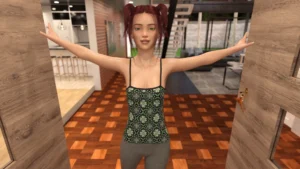
Play Thirty Days
Thirty Days review
Explore Gameplay, Features, and Tips for the Thirty Days Game Experience
Thirty Days is an indie simulation game developed by 3DRComics, known for its immersive storytelling and interactive gameplay. This guide dives into the core mechanics, character interactions, and strategies to help players navigate the game effectively. Whether you’re new or looking to deepen your experience, understanding the nuances of Thirty Days will elevate your gameplay and enjoyment.
Understanding Thirty Days: Gameplay and Core Mechanics
Ever downloaded a game on a whim and found yourself completely, utterly absorbed? 😲 That was me with Thirty Days. I’d seen it mentioned in a forum for indie simulation games, decided to give it a shot, and the next thing I knew, it was 3 a.m. and I was emotionally invested in the fate of my digital avatar’s struggling art career. If you’re curious about this gem, you’ve come to the right place. This chapter is your deep dive into understanding everything that makes this game tick, from its core premise to the mechanics that make your choices truly matter.
### What is Thirty Days? Overview and Setting
So, what exactly is this game? At its heart, Thirty Days is a narrative-driven life simulation. Developed by the passionate solo developer at Lunar Dust Games, it’s a beautiful example of what a small, dedicated team can create. You can find it on PC via major digital distribution platforms, and it’s the kind of experience that feels perfect for a rainy weekend. ☔
The Thirty Days game overview is simple yet profoundly engaging. You step into the shoes of a character who has just moved to a new, slightly run-down apartment in a quiet city with one goal: turn your life around in just one month. The setting isn’t a fantastical world with dragons; it’s grounded, relatable, and achingly real. You might be an aspiring writer battling writer’s block, a musician trying to record a demo, or an artist preparing for a gallery show. Your environment is your small apartment, the local park, the corner store, and a handful of key locations where you’ll meet other characters, each with their own dreams and struggles.
This grounded premise is what sets the stage. The game progression Thirty Days offers isn’t about leveling up in a traditional sense; it’s about personal growth, managing your limited time and resources, and seeing how your story unfolds based on the choices you make every single day. It’s a masterclass in the genre of interactive story games.
### Key Gameplay Features and Player Objectives
The magic of Thirty Days isn’t in flashy graphics or complex controls; it’s in its beautifully crafted Thirty Days gameplay mechanics. Every in-game day is a series of meaningful decisions. You have a limited amount of energy and time each day, and how you spend it is entirely up to you.
Your primary Thirty Days player objectives are to improve your skills, build relationships, and ultimately achieve your character’s personal goal before the month is out. This is broken down into daily tasks:
- Skill Development: You’ll need to practice your craft. For a writer, this means sitting at the typewriter and adding words to your manuscript. Each action consumes energy but increases your skill level, which is crucial for your final outcome.
- Character Interactions: The people you meet are not just set dressing. Talking to them, learning their stories, and helping them with their problems is a core part of the experience. Maybe you’ll help your neighbor find her lost cat or give advice to a friend at the bar. 🐱
- Resource Management: Money is tight! You’ll need to take on part-time jobs (which cost energy but provide crucial cash) to pay your rent and buy food. Do you splurge on a better meal to regain more energy, or save every penny for a new piece of equipment that will help you skill up faster?
It’s a constant, engaging juggling act. A typical day might look like: Work a shift at the cafe -> Practice guitar for two hours -> Go to the park to chat with a friend -> Collapse into bed. The game progression Thirty Days employs is measured in small, daily victories that slowly build toward your month-long goal.
To help visualize how these core systems work together, here’s a breakdown:
| Core Mechanic | What You Do | Primary Effect | Secondary Effect |
|---|---|---|---|
| Practicing Your Craft | Spend energy at your workstation (e.g., writing desk, easel). | Increases your main skill level. | Can trigger inspiration events or character observations. |
| Socializing | Visit locations and talk to other characters. | Deepens relationships and unlocks new story beats. | Can provide temporary stat boosts, gifts, or job opportunities. |
| Working Jobs | Spend a large chunk of energy at a job location. | Earns money to pay rent and buy necessities. | Can sometimes lead to unique interactions or minor skill gains. |
| Resting & Self-Care | Sleep, eat, or relax at home or in the city. | Restores energy and improves mood. | High mood can increase efficiency in other tasks. |
😊 My biggest tip for new players? Don’t try to min-max your first playthrough. Seriously! The beauty of this Thirty Days game overview of mechanics is that they are designed for role-playing. If your character is feeling tired and lonely, maybe skip practicing and go hang out with a friend instead. The most interesting outcomes often come from these “imperfect” choices.
### How Choices Impact the Story and Outcomes
This is where Thirty Days truly shines and separates itself from other games. The game choices impact is not an illusion; it is the very foundation of the entire experience. 🎭 This isn’t a game with one right way to play. Every decision, from how you spend your time to what you say in conversations, ripples outwards to shape your story.
The game features a branching narrative with multiple endings. Did you focus solely on your work and become a brilliant but lonely success? Or did you neglect your craft to help all your friends solve their problems, leading to a fulfilling personal life but an unfinished project? Maybe you found a perfect balance. The game choices impact everything, including:
- Your Final Outcome: Whether you succeed, fail, or find a completely different definition of success based on your priorities.
- Relationship Arcs: Characters will remember your actions. Help someone, and they might return the favor later. consistently blow them off, and they might stop being available altogether.
- World State: Small details in the world can change. A character you helped might appear happier in later encounters, or a location might improve based on your actions.
I learned this the hard way during my first playthrough. I was playing as a musician and became obsessed with getting my skill to the maximum level. I ignored everyone, lived on cheap noodles, and practiced guitar for 8 hours a day. I aced the final gig… but the ending felt hollow. My character was alone, with no one to celebrate with, and the game rightly called me out on it. It was a powerful moment that perfectly illustrates the game choices impact. I had achieved the objective but failed the story.
Pro Tip: Don’t be afraid to save scum! Well, maybe just a little. 😅 Creating a save at the start of a new in-game week lets you experiment with different choices without having to replay the entire game. It’s a fantastic way to see just how different the game progression Thirty Days allows for.
For fans of interactive story games, this is the main attraction. Your playthrough is uniquely yours. The Thirty Days gameplay mechanics are all in service to this philosophy, making you feel the weight of every hour and every conversation. It’s a stunning achievement in player agency and storytelling that will have you immediately starting a new game to see what else is possible.
Thirty Days offers a rich and engaging experience through its interactive storytelling and meaningful player choices. By understanding its gameplay mechanics and narrative structure, players can fully immerse themselves and enjoy the multiple paths the game offers. Whether you’re strategizing daily tasks or exploring character relationships, Thirty Days provides a unique simulation adventure worth exploring. Dive in and discover your own story within the game.





















